LIKE workers struggling with their bosses, tenants dealing with their landlords have little power—as individuals. Organizing, however, turns shared vulnerability into shared power. Tenants can create associations and unions to defend ourselves and our communities against the cruelties of a market-based housing system.
The system as it currently stands prioritizes landlords’ right to property and profit over people’s right to shelter and to remain in the communities they’ve helped build. Why should a corporation’s target profit rate determine whether you can stay in your home of 20 years? Why does the sheriff show up to carry out evictions so much more reliably than the housing inspector shows up to enforce the housing code?
Tenant organizing changes the balance of power. Organizing your building is the first step toward forcing a landlord to patch a roof, or negotiating a lower rent increase, or stopping the eviction and displacement of your neighborhood’s residents. It also creates community, establishing a framework for neighbors to take care of one another, plan for natural disasters and other emergencies, and mediate conflict without police.

You have the right to organize. You have the right to knock on doors, distribute flyers, and hold meetings. Your landlord or building manager may claim you are soliciting or acting in violation of your lease—but they cannot stop you from exercising your rights to free association and assembly. In most states, you can remind your landlord that it’s illegal to retaliate against you for organizing.
Look for a local tenants union that is led and funded by tenants. There are a lot of nonprofit tenant service organizations out there, but they will generally treat you like a customer or a charity case. Tenants unions, on the other hand, will empower you as the expert on your own housing situation and can support your fight through direct action. Most important, tenants unions understand that whatever problem you’re facing is a conflict between people who own property and people who don’t. The Autonomous Tenants Union Network is a great resource for finding existing tenants unions and for getting help if you want to start a new one.
Find out what kind of legal protections apply to your building. Are there rent-stabilized apartments in your area? Is yours one of them? Are there pandemic-specific eviction protections in place where you live? Having a few laws in your pocket can help you strategize.

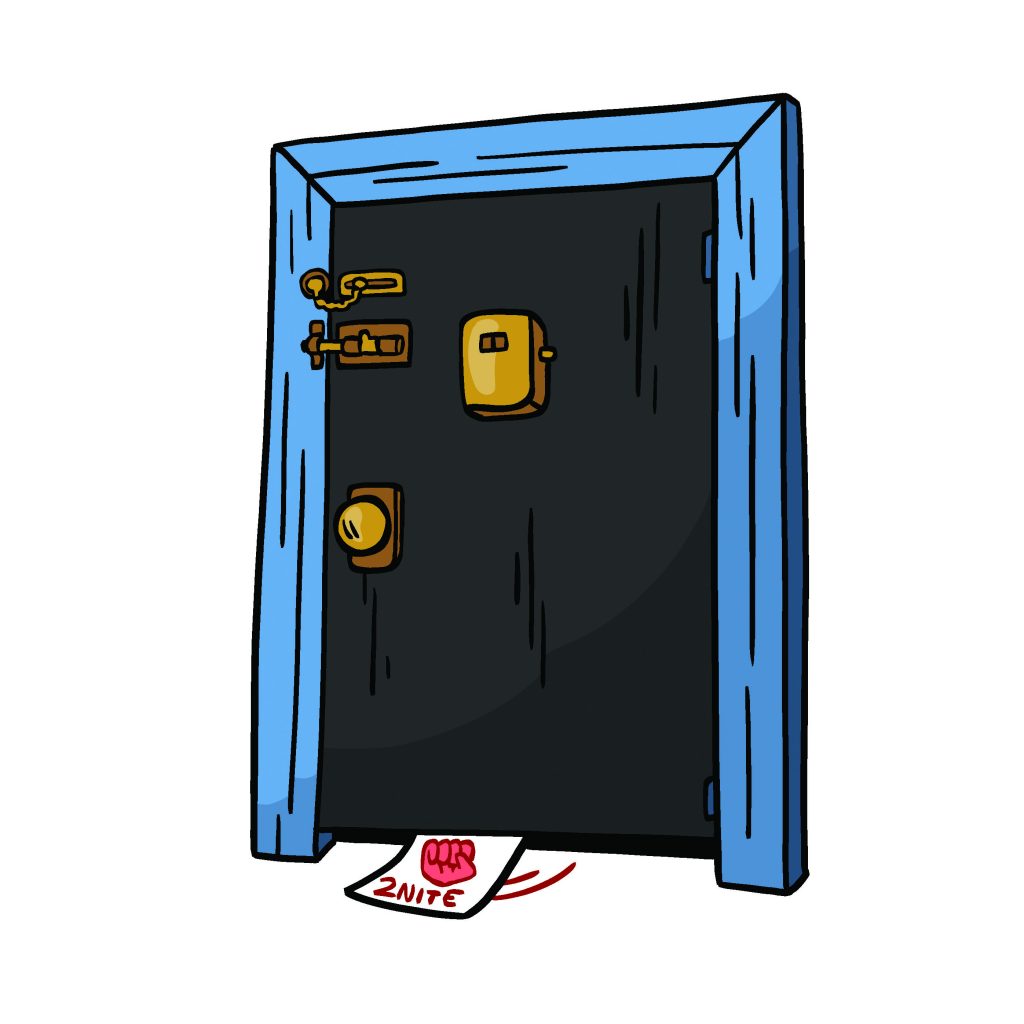
Put up a sign with your contact info; slip notes under your neighbors’ doors; draw on existing relationships; talk to people you pass in the halls. Your goal is to collect the contact information of as many people in your building as possible. Even five people is enough to start—that means you will have four more people collecting contact info!
Your meetings should be accessible and welcoming to the tenants most vulnerable to displacement. Make a note of the languages spoken in your building and think about how you can arrange interpretation. Are there bilingual people in the building who can translate flyers or offer live interpretation at meetings? Within your building, there may be some general distrust of strangers as well as distrust across lines of class, race, and language; the success of your tenants association (TA) will depend on overcoming that distrust.
If organizing during the pandemic, try holding your meeting outside, following distance protocols and wearing masks. You can also hold meetings on a video chat platform, but make sure to figure out how to include neighbors who don’t have computers or reliable internet access. (Some platforms, like Zoom, have a dial-in option.)

Introductions: Make sure your neighbors know that what they say is confidential—you’re not a cop, and you don’t represent the landlord or manager. If you’re meeting in person, bring snacks (and sanitizer). Ask everyone to introduce themselves: What’s your name? How long have you lived in the building? What’s going on in your apartment? Mold? Roaches? How have you been treated by the landlord? Any rent increases? How has Covid affected you? Can you pay rent? Are you okay on food and necessities?
Reflect: After everyone has shared their experiences, ask them to reflect on what they heard. This lets you collectively name the patterns you notice. When tenants can’t afford the rent or live in unsafe, unsanitary conditions, they often blame themselves, or assume they have to live with it. As an organizer, part of your job is to turn individualized shame and acceptance into collective anger.
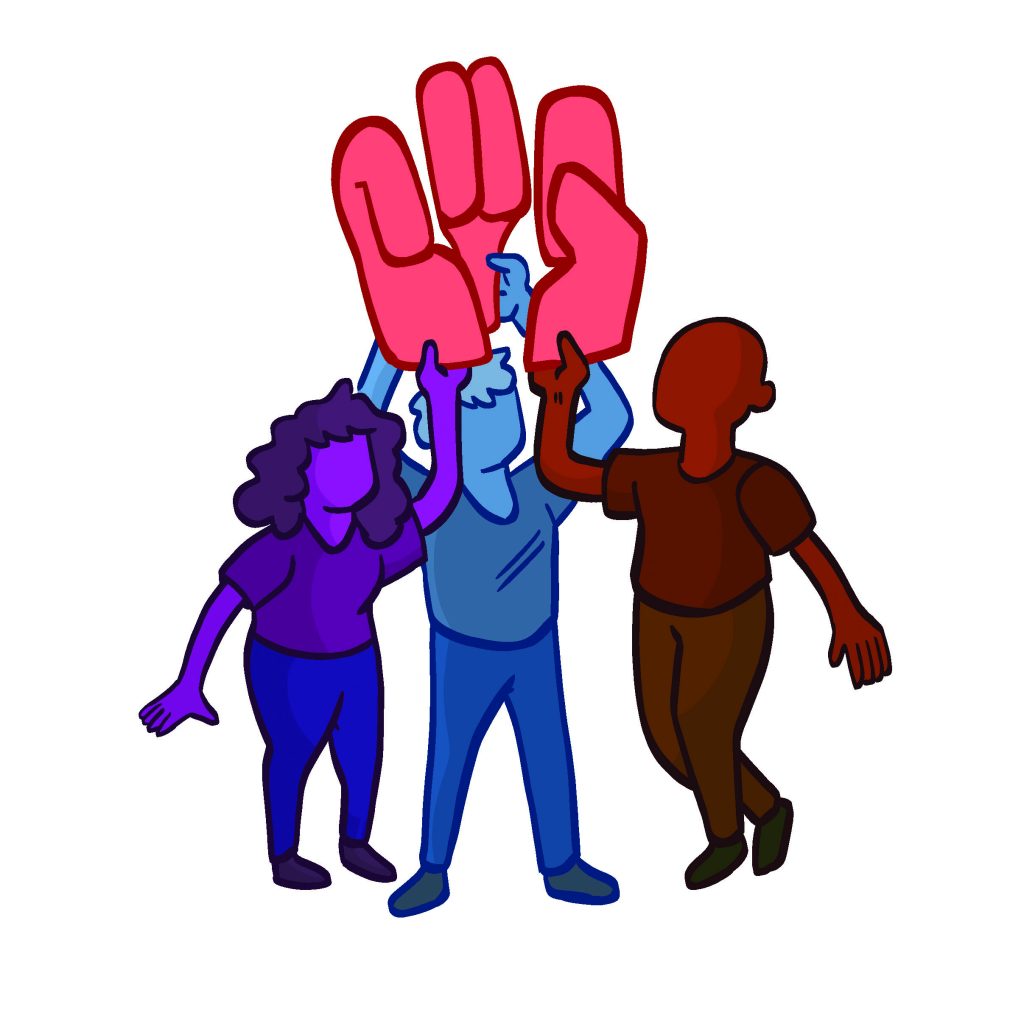
Plan: Talk about what you want to achieve. Rent rollbacks? Canceling rent debt? Payment contingent on meaningful repairs? This won’t be set in stone, but it will help you move forward. Make a list of tasks to get done before the next meeting. Some will involve outreach: You want to get as many people involved as possible, so make a plan to invite more tenants. Others might include researching your landlord, researching your rights, or connecting to a local tenants union. If you’ve convened the group, make sure you’re making room for other tenants to step forward as leaders. Share the contact list, and get everyone in a WhatsApp chat, phone tree, Facebook group, or email list. Choose a date for the second meeting.


As the Philadelphia Tenants Union says, organizing is 90% follow-up. Don’t expect that everyone will remember the meeting time. Follow up with one-on-one calls and reminders.
As you continue to meet, make sure everyone feels like their concerns are being addressed. Warn your neighbors that the landlord will likely try to scare you off from organizing, aim to negotiate with a few people, pick favorites to sow distrust, and refuse to address you collectively at first. This is how landlords show fear! If you discuss these tactics early on, tenants will be less likely to fall for them.


Form a tenants association. This is not a formal or legally elaborate process. You’re just saying, “My fellow tenants and I have decided that we now constitute a new organization,” and identifying yourselves as an entity for collective bargaining. While there’s strength in numbers, you don’t need every apartment in your building to join—an enthusiastic minority will do.
Draft some bylaws: Often, TAs write and sign bylaws to make sure all members are on the same page. Include what the Bay Area organization Tenant and Neighborhood Councils calls a solidarity pledge: an agreement that members will defend each other, act together, and refuse to negotiate with the landlord on their own. You should also plan in advance and as a group how you will make collective decisions. It’s often worth it to take the time to achieve consensus; you risk alienating members if they’re outvoted and unconvinced.
Stay consistent and share power: Make a plan for meeting at regular times, and ask volunteers to sign up for necessary roles. Who is responsible for notifying everyone of meetings? Who can provide childcare so meetings are accessible to parents? Who will compile and submit maintenance requests? Who will connect your building to the broader union or tenant movement? Throughout the process, remember and remind: Leadership is service to the group. Facilitating a meeting is making space for everyone else to share.
Celebrate: Have a signing ceremony! Remember, organizing is about turning strangers into community: Shoot the shit, ask about people’s kids, and crack jokes (particularly at your landlord’s expense).


Congratulations, you’re a collective bargaining unit! Time to get what you want. Send a letter to the landlord with your demands, requesting an immediate response. Announce in the letter that you’ve formed a TA, and instruct the landlord to begin communicating directly with the TA, rather than with individual tenants. Use legalese in communications—reference tenant organizing laws and/or Covid-19 eviction laws—to show that you know your rights and won’t be intimidated by empty threats.

Did your landlord instantly agree to your demands? No?! You might have to escalate.
Official complaints: You want to create a paper trail that will put your landlord on the defensive. Record instances of landlord harassment. Have every member of your association document poor conditions or violations of health and safety codes, then report them to your local housing department. Even failures to post required notices are worth recording.
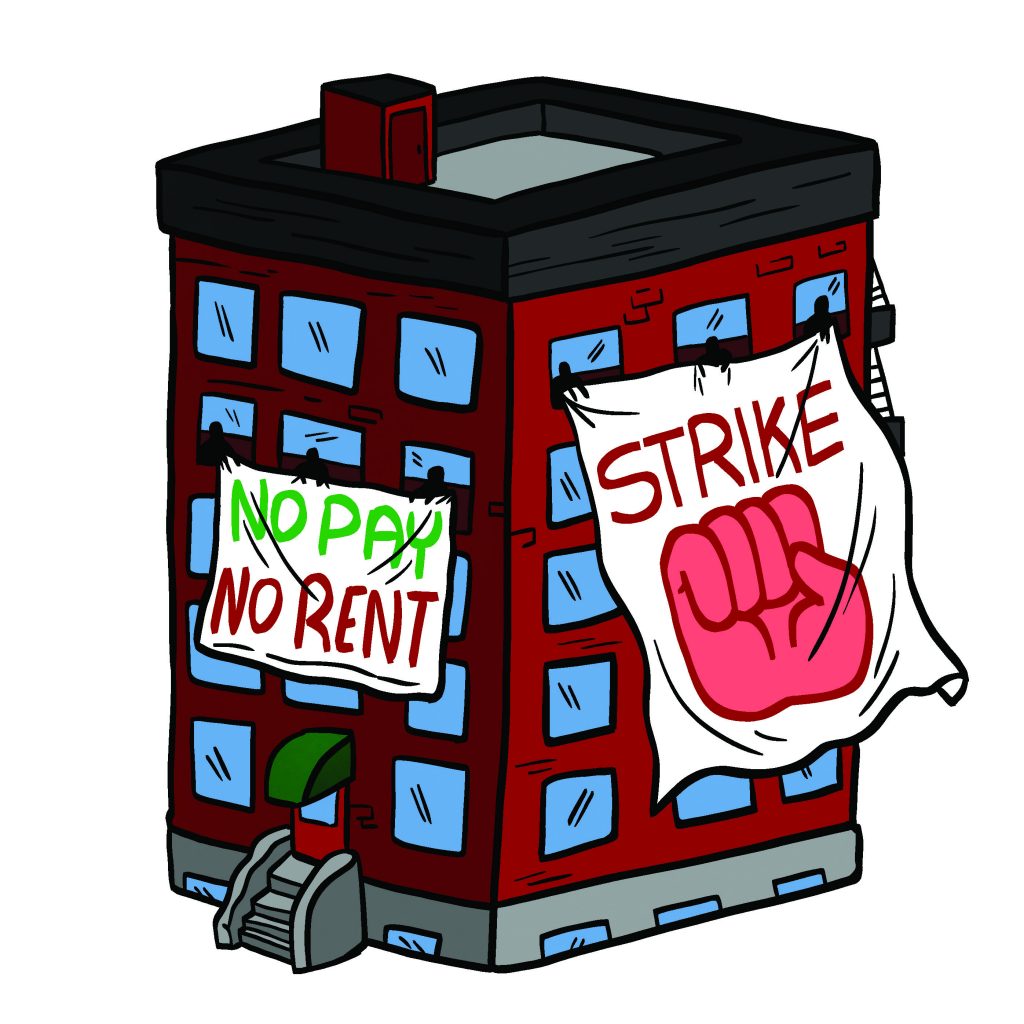
Direct action: Direct actions are good ways to garner public support for your predicament. Marches, protests, block parties, bake sales, and other events in public space—as well as petitions, social media storms, and GoFundMes online—are ways to celebrate the community you’re creating and get a larger community involved. Hold an action outside of your building or in a nearby public place to drum up allies. Protest outside your landlord’s home or their place of work. Leave negative online reviews, publicize poor conditions, expose their life of luxury—in short, shame. Eviction is personal for us; it should be personal for your landlord to carry it out, too. You can also hold actions against failing city agencies and local politicians. Is the housing department failing to respond to calls? Are city council members refusing to support your rights? They are worthy targets!
Engage the media: Media bias runs deep; be sure your press release frames the story you want them to print, and train yourself before interviews. You are not poverty porn. You are not collateral damage. You are fighting back against racist, classist exploitation, eviction, and displacement.
Lawyer up: Having a TA makes it easier for a lawyer to represent you, saving time and resources. Some cities provide legal counsel for tenants facing eviction. Most have pro bono or low-cost options. Your citywide tenants union can help connect you to someone they recommend.
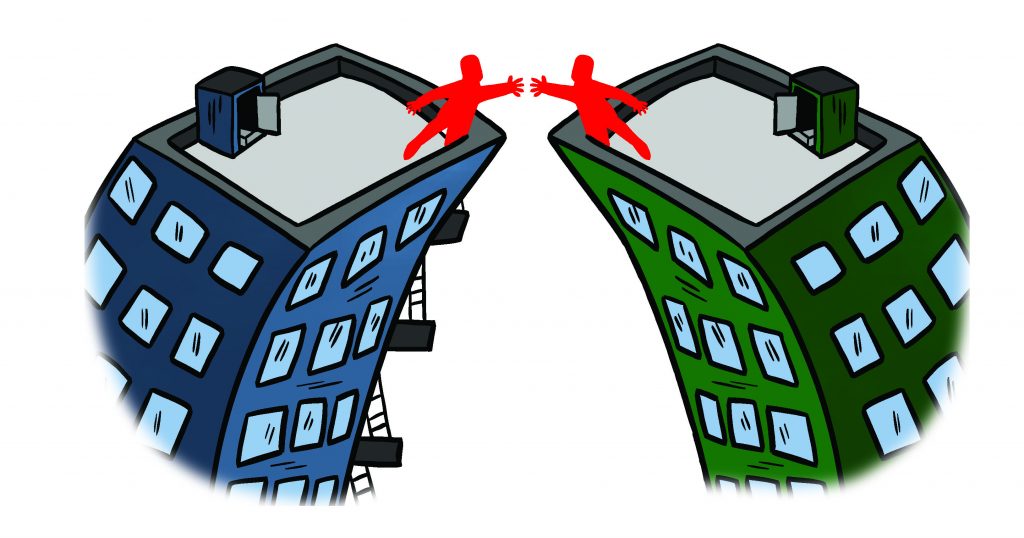
Scale up your association: Does your landlord own other buildings? Can you find them and join forces with the tenants there? The bigger the collective bargaining unit, the more power you wield.
You can also . . .

Often, we use rent strikes to intervene when a landlord is legally permitted to collect rent but should not be—when there’s a gap between what’s legal and what’s right. Why should your rent be due as usual when the elevator is broken and your disability means you can’t take the stairs? Why should your rent be due when a pandemic has severed you from your source of income and the government has told you to stay home? We also use rent strikes when landlords are in breach of existing tenants’ rights laws—of habitability standards or rent stabilization, for instance—and we realize we have no one to enforce the laws but ourselves.
A rent strike gets the goods when a group of tenants is unified in nonpayment and committed to a drawn-out struggle. There are real risks involved in striking: Landlords may threaten to evict you, try to hurt your credit, or put you on tenant blacklists. But in an unjust system, rent strikes can succeed by utilizing the two weapons tenants have at their disposal: solidarity and their rent checks. Over the past century in the US, tenants have used rent strikes to resist price gouging in the Bronx in the 1920s, slum conditions in Harlem in the 1960s, the displacement of mariachi musicians from LA’s Mariachi Plaza in 2017, and many other anti-tenant attacks.
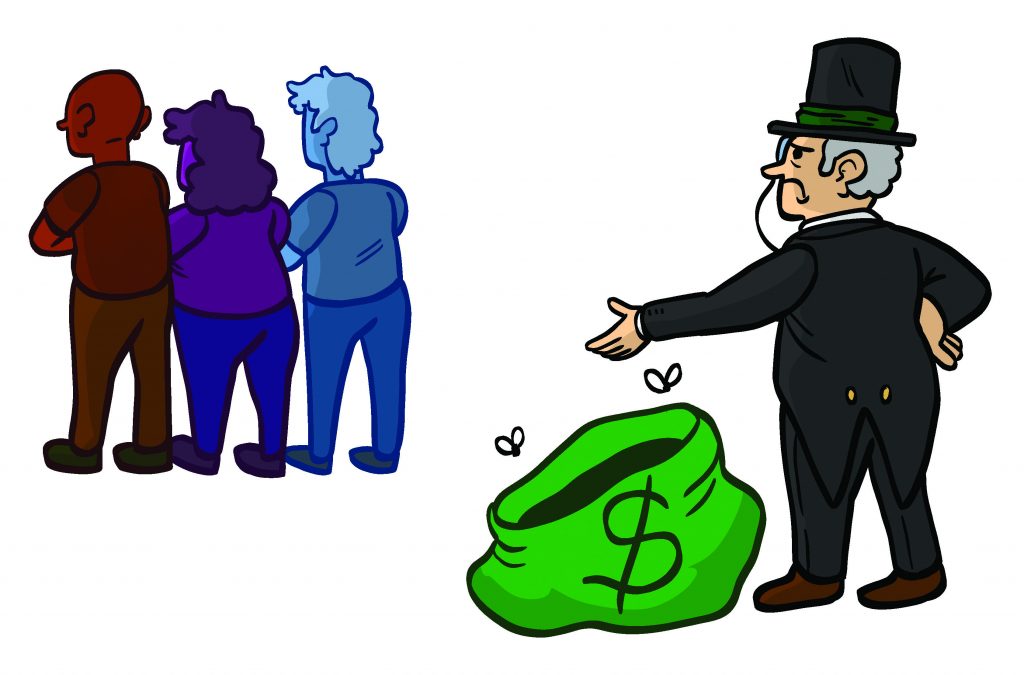
Don’t pay rent: If you’re withholding rent to protest rent increases or to get repairs, your TA should set up an escrow account where tenants put rent money aside. Pooling your rent money into escrow allows you to demonstrate that it exists without handing it over. Suddenly, it’s leverage, an incentive for your landlord to come to the negotiating table.
Can’t pay rent?: If you don’t have the rent money because of Covid-19, solidarity can still help create leverage. If there are other tenants in your association who can pay, but have agreed to withhold rent along with you, they can put this money in an escrow account, or even a savings account. Joining a citywide rent strike, if there is one, will also increase pressure on politicians to respond to the current emergency with mass rent cancellation.
The bottom line is, as a collective bargaining unit, you can make demands on your landlord with or without withheld rent. Asking a landlord to forgive a few months’ rent during a pandemic is a reasonable request! If a request doesn’t work, try a demand. Escalate, through online campaigns and public direct action.

When faced with a strike, protest, or other forms of tenant organization, a landlord may try to intimidate you into paying up, shutting up, or moving out. They may send you a “Notice to Pay/Cure or Quit,” indicating that they’re beginning eviction proceedings. This can be scary, but it’s not the end of organizing work. Eviction is a process, and there are both legal and extralegal strategies to stall and stop it.
Don’t self-evict: Many tenants move out as soon as the landlord tells them to, thus doing the landlord’s work for them, and saving them the cost of a lawyer. Stick it out. There are risks that can come with fighting to stay—but being pushed out of your home or neighborhood (especially during a pandemic!) is even riskier.
If your landlord takes you to court: Tenants who represent themselves in court are much less likely to successfully defend against evictions. A good lawyer will buy time to make discovery requests, collect information, demand a jury trial (as is your right in some states). As the Washington, DC, group Stomp Out Slumlords says, the courts can act as a chokepoint in the displacement machine. Clog the courts!
If your landlord tries to forcibly evict you: Landlords may come in when you’re out and change the locks, cut your electricity or gas, or try to physically remove you. They often enlist the cops, who arrive all too eager to enforce these illegal evictions. Your TA and union connections are necessary here. Show up with supporters, legal observers, cameras—and/or bolt cutters—to defend your right to a legal eviction process.

Maybe your landlord is losing in court and the lawyer fees have gotten out of control. Maybe they’re sick of bad publicity. At some point, your landlord may decide that negotiating is in their best interest, too. Decide as a group what your priorities are and come prepared for negotiations with a list of demands. These negotiations will culminate in a collective bargaining agreement, signed by both your association and your landlord, which could include a rent rollback, the right to keep all rent owed, guarantees of needed repairs, and—sometimes most importantly—the right to renegotiate later.

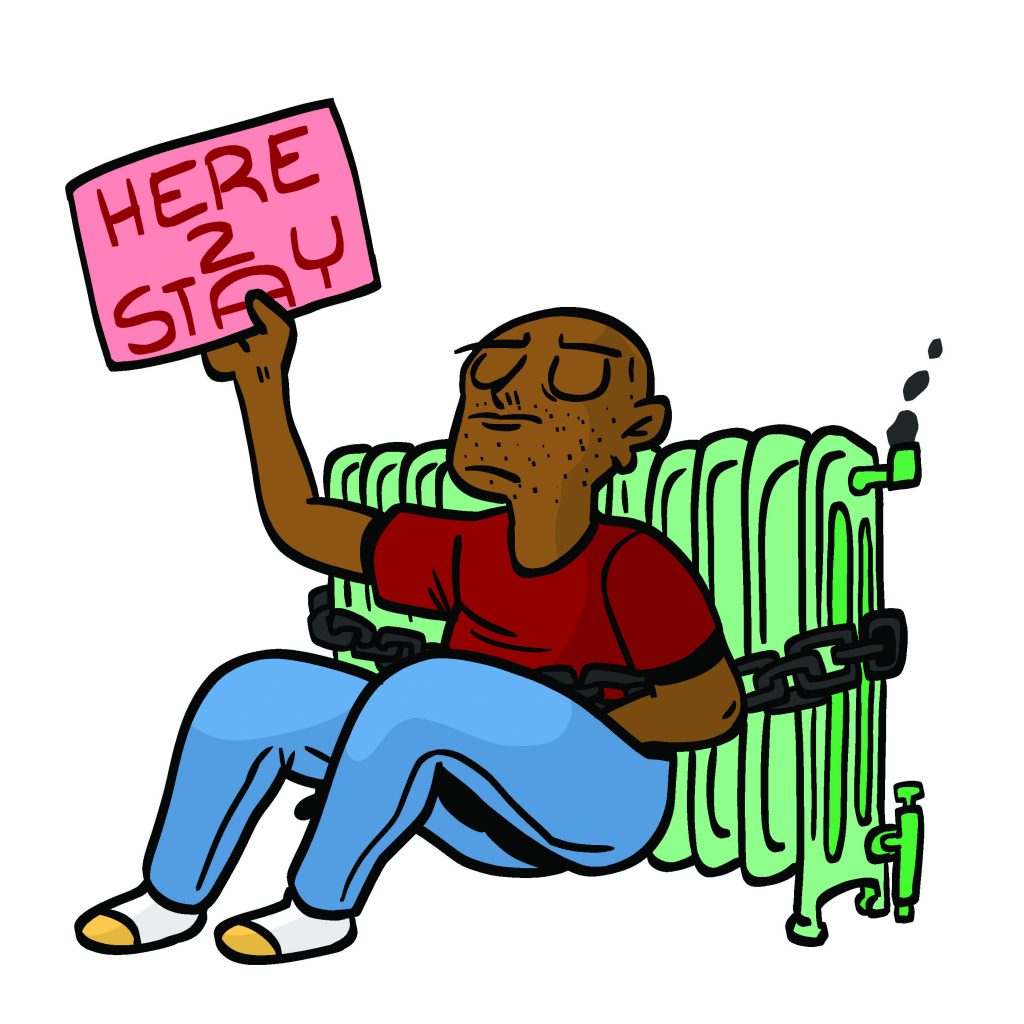
If you’ve already gone to housing court and lost—that is, a judge has signed off on your eviction—it might be time to collectively occupy your housing. Mobilize your association, your community, and your union and greet the sheriffs when they arrive. Discuss multiple levels of defense in advance: Figure out who will support you outside on the street, and who will stay with you inside and risk arrest. In some cases, your goal will be to prevent the eviction from happening, or to move back inside; in others, to garner as much media attention as possible, demonstrating the violence of evictions and politicizing the problem.

We often say in the L.A. Tenants Union that we make our community by defending it. The strength of your tenants association and your tenants union is manifest not only in its ability to win demands, but in its power to create local relationships of trust, mutual aid, care, and support. Tenants associations redefine the home as a site of social struggle. In this way, they allow us to live in the world our campaigns demand—where buildings, neighborhoods, and cities are controlled not by capital, but by their residents.

For more tips about how to organize a building, see the Philadelphia Tenants Union’s Covid-19 Organizing Guide. Tenant and Neighborhood Councils in the Bay Area has a great escalation guide. The Anti-Eviction Operations Manual from Stomp Out Slumlords in Washington, DC has some more information about landlord–tenant court and their blog explains some of the day-to-day process of organizing. The Autonomous Tenants Union Network’s resources page has information from tenants unions across North America about how to write a press release, how to research your landlord, and more. Finally, the L.A. Tenants Union’s Tenants Association Handbook explains why we need a TA in every building and includes stories of tenants associations we organized that successfully fought landlord harassment, rent increases, and evictions.
Rose Lenehan and Tracy Jeanne Rosenthal are members of the Los Angeles Tenants Union.
Mattie Lubchansky is a cartoonist and illustrator living in Queens, NY. You can find their work on The Nib, where they are associate editor, or at matt-lub.com.


